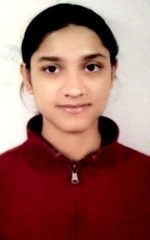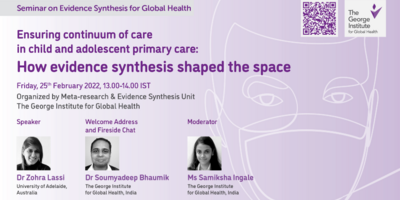
Second Seminar on Evidence Synthesis for Global Health : Doing Guideline Adaptation Right
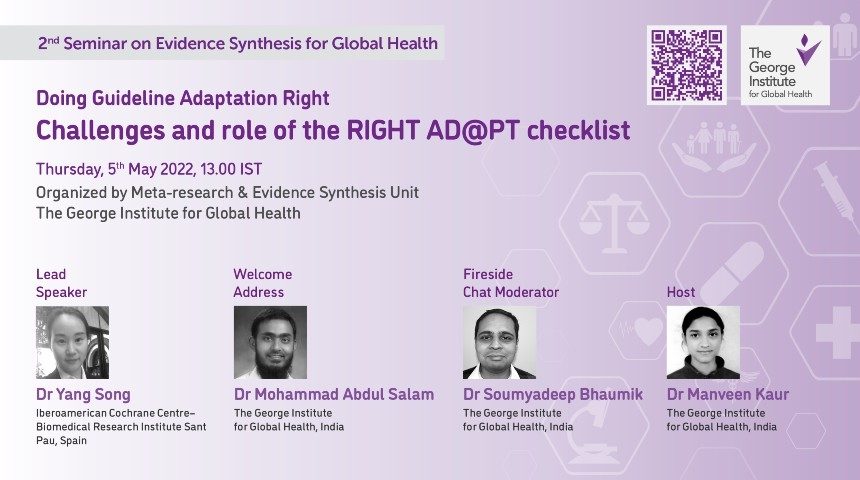
The George Institute continuing its seminar series under Evidence Synthesis for Global Health is organising the second seminar on “Doing Guideline Adaptation Right”, highlighting the challenges and role of the RIGHT AD@PT checklist.
Guideline development is a complex multistage process. Proper reporting is an important step in guideline development. The Reporting Items of Practice Guidelines in Healthcare (RIGHT) statement provides guidance to the developers for the purpose. However, in the case of adapted guidelines, the RIGHT statement is inadequate. The RIGHT AD@PT checklist fills this gap. It builds on the experiences of international stakeholders in guideline adaptation and may improve the completeness of reporting adapted guidelines.
Mark your calendar for 5th May 2022 | 13:00 IST
About the seminar
Clinical Practice Guidelines are the highest quality of evidence to guide clinical practice. Adapting guidelines helps contextualize trustworthy recommendations but is a challenging process. Guidance on how to draft, and report adapted guidelines is rapidly evolving. Researchers, clinicians, and policymakers around the globe have recently published the Right AD@PT checklist for reporting adapted guidelines. The seminar will highlight the challenges in guideline adaptation and the role of the RIGHT AD@PT checklist in mitigating some of the challenges.
Speakers
Lead Speaker : Dr Yang Song - Iberoamerican Cochrane Centre–Biomedical Research Institute Sant Pau (IIB Sant Pau), Barcelona, Spain
Dr Yang Song led the development of a reporting checklist for guideline adaptation (RIGHT-Ad@pt), published in the journal Annals of Internal Medicine. She is dedicated towards improving the guideline development and adaptation methodology in China. Yang is pursuing her Ph.D. in Methodology of Biomedical Research and Public Health, Universitat Autònoma de Barcelona, Barcelona, Spain. She is also a leading author of the RIGHT AD@PT checklist. Her research interests focus on the methodology of clinical guidelines development and adaptation, and biomedical research.
To maximize the efficiency of resources and reduce redundancy, organizations and countries may decide to adapt an existing practice guideline rather than developing de novo guidelines. Although several adaptation frameworks exist, adapted guidelines are generally of low quality, poorly reported, and not based on published frameworks. Dr Yang in her presentation will be talking about the findings from her qualitative research on the challenges of guideline adaptation. She will also be discussing the RIGHT-Ad@pt checklist as a reporting guidance for adapted guidelines, covering the adaptation process and the adapted recommendations.
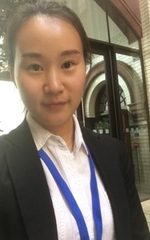
Welcome address : Dr Mohammad Abdul Salam - Program Head, Cardiovascular Research, The George Institute for Global Health, India
Salam is a clinical and public health researcher interested in cardiovascular disease prevention. He is particularly interested in developing, evaluating, and implementing novel low-cost pharmacological interventions. He has experience in clinical trials, systematic reviews and qualitative health research. Abdul Salam has a Master of Pharmacy (Pharmacology) from the Jawaharlal Nehru Technological University, India, and a PhD in Medicine from The University of Sydney, Australia.
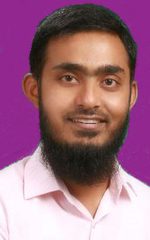
Fireside Chat Moderator : Dr Soumyadeep Bhaumik - Co-Head, Meta-Research & Evidence Synthesis Unit, The George Institute for Global Health, India
Soumyadeep is an international public health specialist, working on evidence synthesis, meta-research, health policy and injury. His work in injury is focused on snakebite and drowning. He has been working on employing a diverse range of methodologies to ensure fit-for-purpose approaches to inform policy, practice, and future research. His work has informed multiple WHO guidelines, technical documents, and national policies.

Host : Dr Manveen Kaur - Research Assistant , Meta Research and Evidence Synthesis Unit, The George Institute for Global Health, India
Manveen leverages her clinical training in MBBS and a fellowship in geriatric medicine for her work. Prior to this, Manveen worked as a registrar and physician for a novel population-based cancer registry at Society for Education, Action and Research (SEARCH), Gadchiroli. She completed her clinical training at the Government Medical College and Hospital, Aurangabad. She also holds an MSc in Gerontology and Ageing from King’s College London.
